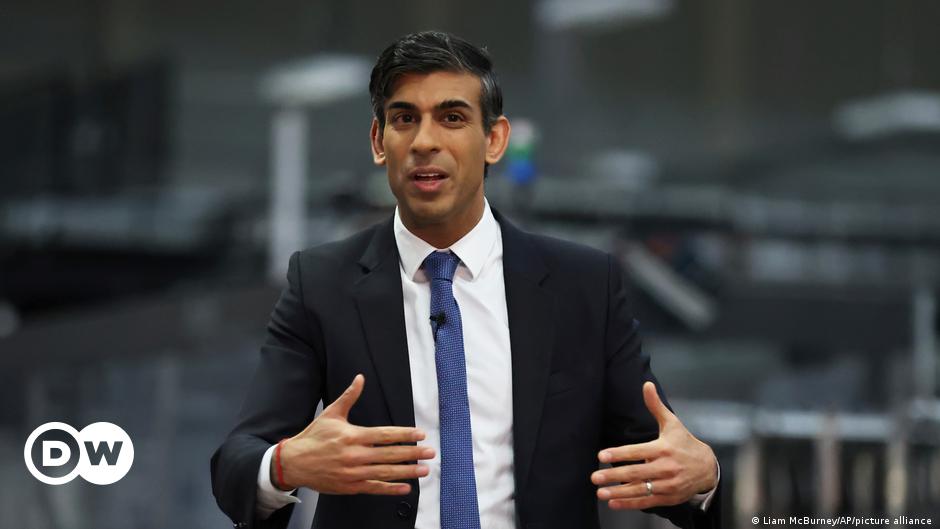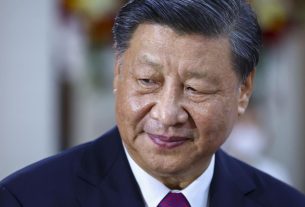British Prime Minister Rishi Sunak traveled to Northern Ireland on Tuesday to try and garner support for a new post-Brexit trading deal with the European Union.
After sealing the deal a day prior with European Commission President Ursula von der Leyen, Sunak hopes to secure the backing of the Democratic Unionist Party (DUP) and end their boycott of Northern Ireland’s power-sharing agreements.
The new agreement, called the Windsor Framework, seeks to ease tensions over Northern Ireland’s status following the UK’s official divorce from the EU in 2020.
The deal aims to improve some of the difficulties that have arisen for goods coming to Northern Ireland from the rest of the UK, while simultanesouly maintaining Northern Ireland’s unique status, effectively still remaining part of the European single market after Brexit.
Unionists in Northern Ireland, who believe the country should remain part of the UK not join with the Republic of Ireland, had objected to the terms of the deal, saying it made the country’s status unacceptably different to that of England, Scotland and Wales.
They had been refusing to participate in power-sharing government with their main rivals, citing dissatisfaction with the deal as the reason. Under the complex rules in Northern Ireland designed to keep the peace, that means that the legislature cannot convene at all.
What did Sunak say?
During his visit to Belfast and other areas of Northern Ireland on Tuesday, Sunak said he wanted to provide details of the new deal, although he acknowledged this would take time.
“I’m also very keen, we’ve not been shy about saying, that the people of Northern Ireland need and deserve their government,” he told reporters.
During a visit to a Coca-Cola factory in Lisburn, Sunak said the deal would make Northern Ireland “the world’s most exciting economic zone” — granting it access to both the EU and UK markets.
“Nobody else has that. No one. Only you guys: only here, and that is the prize,” the prime minister said.
How have officials in Northern Ireland responded?
DUP leader Jefferey Donaldson said that his first reading of the new deal appeared to address his party’s concerns of sovereignty.
But he added that the party would need time to thoroughly review the deal to see if it meets their requirements for returning to the power-sharing government in the Stormont assembly.
The British government has not yet set a deadline for a response.
The DUP, which is Northern Ireland’s second-largest political party, has refused to take part in the power-sharing government in Stormont out of protest over the initial Northern Ireland Protocol.
They argued that the original “Northern Ireland Protocol” amounted to a loss of sovereignty and equal status with England, Scotland and Wales.
Sinn Fein, the largest republican party which advocates for a reunified Ireland, welcomed the new agreement. Sinn Fein’s position has always been that keeping an open Irish border was essential and that remaining in the EU single market was preferable, if not the only way to achieve this.
Maintaining an open border between Northern Ireland and the Republic of Ireland was a key component of the 1990s Good Friday peace deal that broadly ended decades of sectarian and political violence in Northern Ireland.
Michelle O’Neill, Sinn Fein’s vice president and first minister designate, said she’d spoken with Sunak about the deal on Tuesday, saying she “welcomed yesterday’s breakthrough.”
“The priority must now be getting Stormont up and moving without delay,” she wrote on Twitter.
Sinn Fein also overtook the DUP as the biggest power in Northern Irish politics last May — the first time a party advocating a unified Ireland was ever the country’s strongest force. Some DUP critics had questioned whether that change in the balance of power might also help explain their unwillingness to join a power-sharing government at Stormont.
What is in the new agreement?
The Windsor Framework seeks to ease trade rules concerning products that are coming from the UK, as well as address some concerns from the DUP about what role EU law plays in the trade agreements.
The new deal would create a largely customs check-free lane for goods that are coming from the rest of the UK and which are intended to stay in Northern Ireland — and not pass into the Republic of Ireland and the EU’s single market.
This would apply for a range of goods including UK-approved sausages, medicines and plants.
The Windsor Framework also limits but does not completely get rid of oversight by the EU’s European Court of Justice.
Under the new deal, a provision called the “Stormont brake” would allow Norther Ireland’s assembly to block any new laws passed by the EU that would take effect in the province.
rs/msh (Reuters, AFP)



